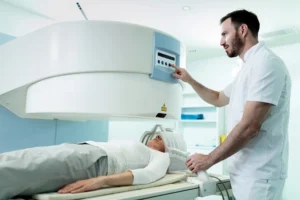EEA Stapler Shows Better Performance Than PPH Staplers for Degree III Hemorrhoids Treatment
- Updated on: Nov 13, 2020
- 3 min Read
- Published on Nov 13, 2020

For treating severe cases of hemorrhoids, doctors usually recommend hemorrhoidal surgery. Suppose you experience severe symptoms of hemorrhoids that have not been improved by home remedies or in-office treatment procedures. In that case, your doctor may advise the removal of the hemorrhoidal tissue by surgery.
Grade III hemorrhoids involve complete prolapse of your anal cushion due to excessive straining or exertion, and it may also require manual reduction to cure your hemorrhoid. There are several surgical methods that are used for the treatment of grade III hemorrhoids, such as conventional hemorrhoidectomy, hemorrhoidal artery ligation, and stapled hemorrhoidopexy.
Stapled Hemorrhoidopexy
Stapled hemorrhoidopexy is an advanced technique to treat grade III and IV hemorrhoid cases. It involves the use of a circular stapler to reduce the hemorrhoidal prolapse by removing the damaged mucosa layer above the dentate line. It fixes the hemorrhoidal tissue to a nearby normal mucosa layer. The hemorrhoidal arteries are also transected to reduce their size.
The major advantage of this method involves minimum wound formation, reduced postoperative pain, shorter operation time, and people can even return to their work faster. These characteristics make this method more effective than the conventional hemorrhoidectomy. This technique possesses the risk of various complications, which can even be life-threatening, such as rectal bleeding, recto-vaginal fistula, retro-rectal hematoma, retro-pneumoperitoneum, pneumo-mediastinum, and complete rectal obliteration.
Two different staplers are used during the stapled hemorrhoidopexy surgery, which is EEA stapler and PPH stapler. These are specialized instruments that are used to perform the surgery. They have different benefits and disadvantages and also vary in their procedure to use. Covidien Company designs the EEA stapler in Ireland, and the PPH stapler is designed by a company named Ethicon EndoSurgery in the United States.
Read About Treating Hemorrhoids
Research Study
A head-to-head study was reported by the Colorectal Disease journal, which discussed the benefits of different types of stapler used in stapled hemorrhoidopexy surgery. The study analyzes the benefits of EEA stapler over PPH stapler used during the circular stapled hemorrhoidopexy procedure.
Donato Altomare, a Professor at the Department of Emergency and Organ Transplantation at the University ‘Aldo Moro’ of Bari, Italy, states that the EEA stapler shows better hemostatic performance compared to the PPH staplers, allowing removal of a larger area of rectal mucosa in the treatment of degree III hemorrhoids.
The professor and his colleagues carried out a study of 135 patients suffering from grade III hemorrhoids. These patients were randomly assigned to receive treatment with the PPH 03 or 01 stapler or the 33 mm EEA stapler.
Read About How Do You Get Hemorrhoids?
Observation From the Study
The following observations were drawn from the study:
The EEA stapler was found to be larger than the PPH stapler. It has a detachable anvil with three anchor points. For most patients, the middle hole of the detachable anvil was used to anchor the purse string, while only four patients required the use of the third hole.
The mean area of the resected mucosa in the EEA group of patients was found to be 33.75 cm2, whereas, for the PPH group of patients, the mean was 28.05 cm2.
In the EEA group, fewer over stitches were required to attain hemostasis following the stapling of the hemorrhoidal tissue. However, the PPH group of patients required a large number of stitches to stop hemorrhoidal bleeding.
The scientist observed that two patients from the PPH group had suffered moderate postoperative bleeding, but no patients had postoperative bleeding in the EEA group. Therefore, EEA staplers show effective hemostasis action than the PPH staplers.
The use of PPH stapler also increases the risk of hemorrhoid recurrence, where about half of the patients undergone stapled hemorrhoidopexy may require surgery in the near future. The scientist decided to conduct a long-term follow-up of patients undergone surgery using the EEA staplers to determine whether the chance of hemorrhoid recurrence still remains.












